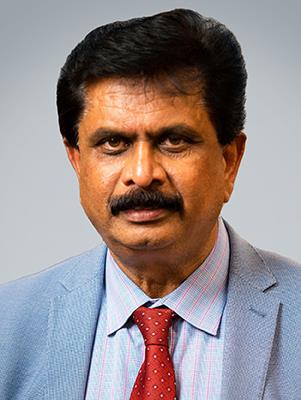This award recognizes an SOT member who has made substantial and seminal scientific contributions to the understanding of the science of toxicology and is actively involved in toxicological research.


Anumantha G. Kanthasamy, PhD, is awarded the 2023 SOT Distinguished Toxicology Scholar Award for his service to the fields of toxicology and neuroscience and particularly for his leadership in unraveling novel signaling pathways contributing to neurotoxicity and Parkinson’s disease. As part of this award, Dr. Kanthasamy will deliver the Distinguished Toxicology Scholar Award Lecture on Tuesday, March 21, 11:00 am–12:00 Noon as part of the 2023 SOT Annual Meeting and ToxExpo.
Dr. Kanthasamy received his undergraduate and PhD education in biochemistry in India at the University of Madras and then conducted postdoctoral training in medicinal chemistry and molecular pharmacology at Purdue University in Indiana. After completing his junior faculty position in the Department of Neurology and Environmental Health at the University of California Irvine, he rose through the ranks of the Department of Biomedical Sciences at Iowa State University from 2011 to 2021, culminating in becoming Distinguished Professor and Chair of the department and appointment as Lloyd Chair and Eminent Scholar in Neurotoxicology. In September 2021, he joined the University of Georgia (UGA) as the John H. “Johnny” Isakson Chair and Georgia Research Alliance Eminent Scholar in the College of Veterinary Medicine Department of Physiology and Pharmacology. He also is the founding Director of the Center for Neurological Disease Research at UGA.
Dr. Kanthasamy’s research expertise has been exceptionally strong in the mechanisms of Parkinson’s disease neurodegeneration. More specifically, he is recognized for his work studying the relationships of protein aggregation and neurotoxicology and disease, mechanisms of misfolded protein propagation, oxidative stress in dopamine neurons, stress signaling, and mitochondrial biology in neurological function. More recently, his work also has contributed to understanding the role of the gut microbiome in neurodegenerative disease. He is widely recognized for his contributions that demonstrate the key roles for protein kinase c-delta in neurodegenerative disease.
In 2006, Dr. Kanthasamy founded the Iowa Center for Advanced Neurotoxicology (ICAN) and continues to serve as its Director. ICAN was established to promote both basic and translational neurotoxicological research among neuroscientists, pharmacologists, and toxicologists at Iowa State University. At ICAN, he directed the Presidential Interdisciplinary Research Initiative titled Big Data Brain Initiative, which researched Parkinson’s and Alzheimer’s disease.
As an indicator of external recognition of his scientific excellence, Dr. Kanthasamy’s research program has been supported by over $30 million in funding, including three active R01 and two U01 grants from the National Institute of Environmental Health Sciences (NIEHS), National Institute of Neurological Disorders and Stroke (NINDS), and National Institute on Aging where he serves as Principal Investigator (PI), as well as a US Department of Defense Congressionally Directed Medical Research Program grant as PI, and other active funding. He holds additional grants from the Michael J. Fox Foundation and National Institutes of Health (NIH) Small Business Innovation Research grant.
Dr. Kanthasamy is internationally recognized for his work in multiple areas related to neurotoxicity and neurodegeneration. His impact in these areas can be measured by the enormous number of invited presentations of his research worldwide, the number of grant review panels on which he serves, and the sustained publication productivity giving rise to more than 180 published manuscripts in the top journals in toxicology and neuroscience. He has an h-index of 71 and an i-10 index of 180 according to Google Scholar in December 2022. The h-index indicates at least 64 of his papers have been cited at least 64 times in the literature, and 170 publications have been cited at least 10 times. His work has been cited a total of 25,503 times.
Dr. Kanthasamy also founded two biotech companies aimed at translating his research from the laboratory to the clinic to develop therapeutic and diagnostic strategies for neurodegenerative diseases.
In addition to his distinguished research and publications, Dr. Kanthasamy has an impressive track record of training PhD students. He has mentored more than 30 doctoral students who have won more than 200 awards, published high-impact papers, and gone on to careers at top institutions in academia, industry, and government.
Dr. Kanthasamy served as Vice President and President of the SOT Neurotoxicology Specialty Section. Dr. Kanthasamy was elected Fellow of the American Association of the Advancement of Science in 2015, Fellow of the Academy of Toxicological Sciences in 2015, and Fellow of the National Academy of Inventors in 2021.
Dr. Kanthasamy has served on five Editorial Boards focused on toxicology and neuroscience, including serving as an Associate Editor for Toxicological Sciences and is an ad hoc reviewer for countless journals. Finally, he is a reviewer for a multitude of study sections for NIEHS and NINDS. He has been a permanent member on multiple study sections for NIH and served as an ad hoc reviewer for more than 20 panels since 2016.
To view all the 2023 Award recipients, visit the SOT website or read the SOT Awards Program PDF.
#Communique:SOTNews
#Awards
#Members